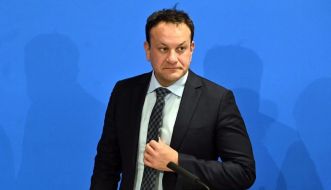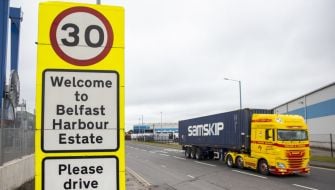The UK's supreme court judgment affirming the lawfulness of the Northern Ireland Protocol highlights why solutions to the contentious trading arrangements must be found by the British government, DUP leader Sir Jeffrey Donaldson has said.
The UK’s highest court dismissed a challenge from a group of unionists and Brexiteers who claimed the protocol breached the Acts of Union and the Northern Ireland Act.
Sinn Féin reacted to the judgment by stating it was now time to “move forward politically” and secure a deal between the UK and the EU over differences regarding the treaty.
The protocol was agreed by the UK and EU in 2019 to avoid a hard border between the Republic and the North.
However, the arrangement is opposed by unionists, and the DUP last year collapsed the Stormont Assembly in protest over its terms.

Mr Donaldson was at the supreme court in London on Wednesday to hear Lord Stephens rule that the challenge was “unanimously dismissed” on all grounds.
Speaking afterwards, Mr Donaldson said: “A solution to the protocol was never going to be found in the courts, but the cases have served to highlight some of the reasons why unionists have uniformly rejected the protocol.
“The government must consider this judgment, their own arguments to the court and take the steps necessary to replace the protocol with arrangements that unionists can support.
“The protocol represents an existential threat to the future of Northern Ireland’s place within the union.
“The longer the protocol remains, the more it will harm the union itself.”
He added: “The checks on the Irish Sea border are the symptom of the underlying problem: namely, that Northern Ireland is subject to a different set of laws imposed upon us by a foreign entity without any say or vote by any elected representative of the people of Northern Ireland.
“Political progress in Northern Ireland was hard won and is built on the support of unionists and nationalists.
“There will be no solid basis for an executive and assembly until the protocol is replaced with arrangements that restore Northern Ireland’s place in the UK internal market and our constitutional arrangements are respected.”

Sinn Féin Brexit spokesperson Declan Kearney welcomed the court judgment, and said while the protocol was “not perfect”, it is “clearly necessary”.
He said: “The Westminster parliament ratified it and has given it effect in domestic law. They are bound as a matter of international law to comply in good faith with the treaty they entered into.
“Today’s supreme court judgment recognises and affirms this reality in law.
“Now that legal clarity has been confirmed, it is time to move forward politically and ensure that a deal between the British government and EU to deliver pragmatic and durable solutions is secured without delay that makes the protocol work better for everyone.”

SDLP Stormont leader Matthew O’Toole said the judgment provided “important clarity” on the lawful status of the protocol.
He said: “Following this judgment, it is now critical that the EU and UK negotiating teams reach a comprehensive resolution that protects our unique access to the single market for goods while addressing the concerns around protocol implementation that have given rise to sincere objections related to trade barriers and identity issues in the unionist community.
“The people of Northern Ireland deserve government.”

But TUV leader Jim Allister, one of those who brought the legal challenge, said the verdict did not affect the “political unacceptability” of the protocol.
He said: “The essence of our legal challenge was to the lawfulness of the protocol.
“The fact the supreme court is satisfied it was lawfully made does not in the least affect its political unacceptability, nor its dire constitutional consequences.
“Indeed, findings of the supreme court greatly strengthen our case against the protocol.”
He continued: “If anything, the supreme court ruling must embolden the political campaign against the protocol, because that is now the critical arena of challenge.
“It is hard to see how Stormont ever returns in circumstances where Article 6 of the Acts of Union is in suspension.”







